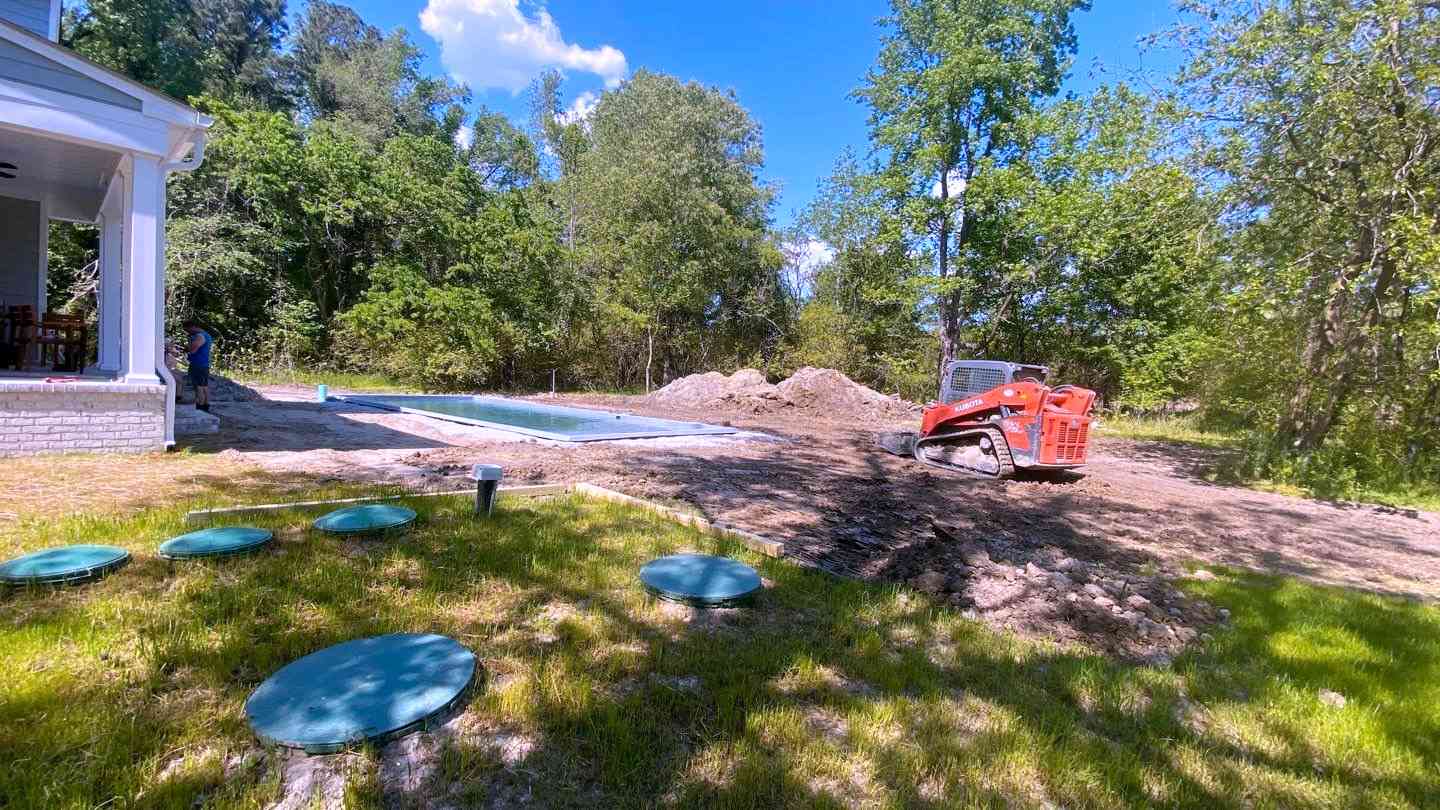
All You Need to Know About Building a Swimming Pool in Virginia Beach
Living in Virginia Beach, the allure of sun, sand, and surf is irresistible. However, have you ever contemplated the unique pleasure of having a personal oasis in your backyard? We’re talking about the privilege of owning a swimming pool, a luxury that adds immense value to your Virginia Beach home and provides a perfect escape from the summer heat.
For many, building a swimming pool raises several questions and concerns. “Is it a worthy investment?” “Can we use it throughout the year?” “What’s the process of constructing a swimming pool?” “How costly is it to maintain?” If you are grappling with these queries, this article is just for you!
Here, we delve into the nitty-gritty of building a swimming pool in Virginia Beach, tackling the common concerns and clearly showing what you should expect in this journey. From understanding the legal requirements and pool regulations to selecting the right builder, we will guide you through each step, ensuring you’re well-equipped to make informed decisions.
Why a swimming pool? Besides the obvious charm of having a fantastic retreat during hot summer days, a swimming pool can transform your home into an entertainer’s paradise, a personal fitness hub, or even a tranquil sanctuary for relaxation. It enhances your property’s aesthetic appeal and significantly boosts its market value.
So, let’s push aside the doubts and dive into the exciting adventure of pool construction in Virginia Beach, making the most of the sunny clime while creating a year-round leisure hub right at home.
In the following sections, we’ll walk you through everything you need to know before you commence your swimming pool construction, turning your dream of a backyard oasis into a splendid reality. So let’s dive in! Remember to keep this guide handy as we embark on this exciting journey together. Now, let’s take the plunge!
The Preliminary Steps: What You Need to Know Before Building a Swimming Pool
An investment like building a swimming pool is far from impulsive. It requires careful planning, a well-thought-out strategy, and adherence to specific guidelines and procedures. This section unfolds the initial steps to prepare for pool construction, offering insights to make the journey smoother and more predictable.
- Understand the Legal Requirements: Your journey begins with familiarizing yourself with the local laws and permits required for pool installation in Virginia Beach. Any structure that holds more than 500 gallons of water, exceeds 150 square feet or is more profound than 24 inches necessitates a building permit. You must be prepared to obtain not just one but four distinct permits before installation begins: a pool permit, barrier permit, electrical permit, and gas permit (if your pool will be heated by gas). Note that your existing barriers and electrical systems must comply with code laws to secure these permits.
- Set Your Plan: Once you’ve navigated the legal framework, the next step involves charting a clear plan for your swimming pool. This includes decisions like pool type, size, shape, depth, and additional features. Remember, this plan must include a detailed plot showing the proposed distances from the pool to all property lines and the house. It must also align with the Planning Department’s setback requirements.
- Pick the Right Contractor: A competent, reliable pool builder can make or break your swimming pool project. Prioritize contractors who have been in the business for several years, possess the necessary certifications and licenses, and can provide verified insurance. Compare costs and get estimates from at least three companies. Remember to get everything in writing, including potential cost variations and warranties.
- Prepare for Inspections: Inspections are a vital part of the pool construction process. Expect your pool to be thoroughly examined at various stages, from pool footing inspection for in-ground pools to final electrical inspection. It might seem daunting, but these are essential steps to ensure your pool’s safety and compliance with regulations.
- Budget Considerations: Lastly, be prepared for the financial commitment that a swimming pool entails. While the initial cost varies depending on the pool type, remember to account for ongoing maintenance costs.
Building a swimming pool in Virginia Beach is an exciting journey filled with significant decisions, careful planning, and meticulous execution. A solid grasp of these preliminary steps will ensure you navigate this process smoothly, bringing you one step closer to the backyard oasis of your dreams. And remember, a well-constructed swimming pool is not just a personal luxury; it’s a testament to your home’s enhanced appeal and value.
Understanding the Permits Required
Delving into the realm of pool construction in Virginia Beach, one inevitably encounters the realm of permits. It’s an essential part of the process, a fundamental checkpoint ensuring safety and legality. This segment unravels the intricacies of the four essential permits you’ll need for your pool installation and the steps to obtain them.
- Pool Permit: The pool permit is the most basic requirement for any pool construction. This permit is crucial as it certifies your pool’s structure complies with local building codes. To obtain this, submit a detailed plot plan, construction drawings, and a swimming pool affidavit to the city’s permit office.
- Barrier Permit: Safety is paramount, and the barrier permit underscores this. It may be bundled with your pool permit if obtained together. This permit ensures that your pool is adequately fenced to prevent accidental drowning or unauthorized access. A well-detailed plan showing the proposed fence must be submitted for approval.
- Electrical Permit: All swimming pools require an electrical permit, reflecting the vital role electricity plays in running pumps, heaters, and lighting. An electrician must inspect the electrical work and certify its compliance with safety standards.
- Gas Permit: A gas permit becomes mandatory if you plan to heat your pool with a gas heater. This ensures your gas installation is up to code and safe to operate.
While these permits might seem like bureaucratic red tape, remember that they are in place for safety reasons and compliance with building standards. More importantly, they grant you the peace of mind that your pool meets all the required specifications and safety measures. It might seem tempting to sidestep this process, but the city imposes hefty fines for non-compliance.
The Specific Pool Regulations in Virginia Beach
When designing your perfect aquatic retreat in Virginia Beach, the local pool regulations must factor into your plans. Here, we will focus on regulations relating to the deck, climbability, and other essential elements of your swimming pool.
Deck: Firstly, the pool deck isn’t just an add-on; it’s a must-have. Virginia Beach regulations necessitate a deck extending around the entire perimeter of your pool. The material chosen should have a smooth finish and a slight slope to facilitate drainage away from the pool area. So, yes, lounging space is a requirement, not a luxury!
Climbability: Innovative and exotic pool features like waterfalls and coves might seem alluring. However, the city regulates these to prevent them from becoming safety hazards. Climbable structures aren’t permitted within your pool, which curbs the potential for falls and injuries. Opt for safety-approved accessories like diving boards instead.
Entrapment Protection: Circulation systems need to meet specific safety requirements for the safety of all swimmers, especially children. These include the isolation of suction outlets and the installation of approved drain grates or systems.
Fencing: To secure your pool, fencing is obligatory in Virginia Beach. The fence must be at least 4 feet tall and lockable to prevent unauthorized access. If your home is a barrier, installing an alarm that meets specific requirements is also mandatory.
Above-Ground Pools: The pool walls can act as a fence for above-ground pools. However, an additional barrier should be around the steps or ladder leading to the pool entry. While these regulations might seem overwhelming, they are all designed with safety and functionality in mind. By adhering to them, you are not only following the law but also ensuring the safety of everyone who uses your pool.
Securing the Swimming Pool: Understanding the Virginia Beach Pool Fence Code
Securing your pool isn’t just a good idea – it’s a law in Virginia Beach. The city’s pool fence code aims to enhance safety, prevent accidental drownings, and ensure your pool isn’t a hazard.
According to the Virginia Beach pool fence code, your pool must be entirely enclosed by a fence. The minimum height for this fence is four feet. This regulation applies to all pools, whether seasonally or year-round.
One crucial factor to note is the requirement for the gate. The fence gate must be self-closing and self-latching. If the latch is less than 54 inches high, the gate must open outward, away from the pool. This regulation is in place to prevent young children from gaining unsupervised access to the pool area.
If your property’s structure (like your house) is part of the pool barrier, you’ll need an alarm installed on the doors leading to the pool area. This alarm should be loud enough to be heard throughout the house and must reset automatically.
For above-ground pools, the sides of the pool can act as the barrier, provided they meet the height requirement. However, any ladder or steps leading up to the pool should be secured with a barrier or be removable when the pool isn’t in use.
Non-compliance with these laws carries significant penalties. Pool owners who fail to adhere to the fence regulations can face a fine of up to $300. So, it’s crucial to understand these regulations and ensure your pool area fully complies. The Virginia Beach, pool fence code, is more than a legal requirement. It’s a tool for ensuring the safety and security of your pool, your loved ones, and your community.
Entrapment Requirements: Enhancing Safety for Swimmers
As part of the pool-building process, taking steps to prevent pool entrapment is vital. Entrapment occurs when a swimmer becomes trapped in a pool or spa’s suction outlet. Virginia Beach has stringent entrapment requirements to safeguard swimmers from this potential hazard.
One crucial requirement pertains to the circulation systems of pools and spas. These systems, which help keep your pool water clean and clear, must be equipped to prevent suction entrapment. For instance, all suction outlets must have a cover that meets industry safety standards.
In pools with a single suction outlet, other than an automatic vacuum cleaner system, an approved safety vacuum release system must be installed. Your pool must be at least three feet apart if it has multiple suction outlets. They must also be piped so that water is drawn through them simultaneously through a vacuum-relief-protected line.
Additionally, any vacuum or pressure cleaner fitting must be located to be accessible and easily visible. These fittings should also be installed at least six to twelve inches below your pool’s minimum operational water level. While these entrapment requirements might seem complex, they are critical in ensuring swimmer safety.
The Inspection Process: A Key Step to Compliance
Following the completion of your pool’s construction, there’s one final step you’ll need to complete before you can enjoy your new oasis: the inspection process. The city of Virginia Beach carries out this vital step to ensure that all swimming pools comply with local regulations and safety standards.
At the top of the inspection checklist is the pool footing inspection for inground pools. This inspection verifies that the pool has been constructed securely, with a firm and stable footing, to prevent potential structural issues. The city also conducts a bonding-grounding review for inground pools, checking that the pool’s electrical systems are correctly grounded to avoid electrical shocks.
If your pool or spa features gas heating, you must undergo a rough-in and final gas inspection. This inspection ensures that the gas lines have been correctly installed and pose no risk of leaks.
An essential part of the inspection process is the final electrical inspection. During this inspection, the city confirms that all electrical components, such as lighting and pump systems, have been correctly installed and are safe to use.
The inspection process also includes a barrier inspection to verify that your pool is adequately secured with a fence, as the Virginia Beach Pool Fence Code requires. This inspection can be carried out simultaneously with the final building inspection. While the inspection process may seem lengthy, it’s a crucial step toward ensuring your pool’s safety and compliance.
Understanding the Costs: A Look at Different Types of Swimming Pools and Their Costs
Investing in a swimming pool is a significant financial commitment. It’s crucial to understand the costs associated with different types of swimming pools and ongoing maintenance costs to make an informed decision that aligns with your budget and lifestyle.
In-ground swimming pools, while offering more design flexibility and increased home value, typically require a more considerable investment upfront. Depending on the materials used—concrete, vinyl liner, or fiberglass—the cost can range widely from $25,000 to over $100,000. It’s essential to remember that these costs can increase depending on customization, such as adding a spa, waterfall, or other luxury features.
Alternatively, above-ground pools offer a more budget-friendly option, typically costing between $1,000 and $12,000, depending on the size and quality of materials used. While less customizable than in-ground pools, they provide a cost-effective way to enjoy the benefits of pool ownership.
Regardless of the type of pool you choose, maintenance costs are a crucial aspect to consider. On average, pool owners can expect to spend around $1,200 to $1,800 per year on pool maintenance. This estimate includes cleaning costs, chemical balancing, and potential repair needs.
Additionally, consider the cost of water, heating, and potential increases to home insurance and property taxes. These costs may take time to determine but can significantly impact the total cost of pool ownership. Understanding the costs associated with different types of pools and their maintenance is vital in making an informed decision about pool ownership.
Conclusion
Embarking on the journey of constructing a swimming pool in Virginia Beach promises a world of joy and relaxation. But, it’s a voyage that requires precise planning and careful execution. From understanding the foundational steps, procuring the proper permits, adhering to specific pool regulations and fence codes, ensuring safety through entrapment requirements, navigating the inspection process, and comprehending the associated costs – every detail matters in bringing your pool dream to life.
Moreover, knowing the cost of different types of pools and their maintenance can empower you to make an informed decision. It allows you to foresee and plan for any financial commitments, ensuring your dream pool doesn’t become a financial nightmare.
As the golden rays of the Virginia Beach sunshine, there’s no better time to start envisioning the sparkling water of your future pool. The laughter and joyful splashes of your loved ones enjoying a private oasis in your backyard are closer than you think.
At PoolForce, we’re more than a pool construction company – your trusted partner in this exciting journey. Our team of seasoned experts is ready to guide you through each step, turning your dream pool into a stunning reality. We offer transparent estimations and personalized construction plans tailored to your needs and budget.
So why wait? Contact us today at PoolForce, and let’s dive into creating your backyard paradise.









